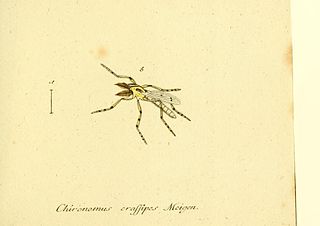Related Research Articles
Antillocladius is a genus of midges belonging to the family Chironomidae, subfamily Orthocladiinae. The name Antillocladius means orthoclad that occurs in the Antilles, where it was primarily recorded.
Litocladius is a genus of chironomid midges that belongs to the subfamily Orthocladiinae and is composed of three species, Litocladius confusus Mendes et Andersen (2008), Litocladius mateusi Mendes, Andersen & Sæther (2004), and Litocladius floripa Mendes et Andersen (2008) all described from Brazil only. Male, female, and pupa of the type species are described, the remaining two species are known only from the male adults. This species are known from the Atlantic Forest, along the Brazilian coastline.
Ichthyocladius is a genus of chironomid midges that belongs to the subfamily Orthocladiinae described by Fittkau based on one species, Ichthyocladius neotropicus, from Peru, though some other species were recognised, the lack of knowledge did not allow their description. Two additional species from Brazil were described by Mendes, Andersen & Sæther.

Orthocladiinae is a subfamily of midges in the non-biting midge family (Chironomidae). For lack of a better common name, they are simply referred to as orthoclads.
Abiskomyia is a genus of European non-biting midges in the subfamily Orthocladiinae of the bloodworm family (Chironomidae).
Boreosmittia is a genus of European non-biting midges in the subfamily Orthocladiinae of the bloodworm family (Chironomidae).
Diplocladius is a genus of non-biting midges in the subfamily Orthocladiinae of the bloodworm family Chironomidae.

Eurycnemus is a genus of European non-biting midges in the subfamily Orthocladiinae of the bloodworm family (Chironomidae).
Gymnometriocnemus is a genus of non-biting midges in the subfamily Orthocladiinae of the bloodworm family (Chironomidae). The genus is divided into two subgenera, Raphidocladius Sæther 1983 and Gymnometriocnemus Goetghebuer, 1932. Males of the former subgenus are characterized by possessing an extremely long virga with needle-like sclerotization, species of the later characterized by a short virga and a weakly developed crista dorsalis in the adult male hypopygium.
Heterotanytarsus is a genus of European non-biting midges in the subfamily Orthocladiinae of the bloodworm family (Chironomidae).
Heterotrissocladius is a genus of European non-biting midges in the subfamily Orthocladiinae of the bloodworm family (Chironomidae).
Krenosmittia is a genus of European non-biting midges in the subfamily Orthocladiinae of the bloodworm family (Chironomidae).

Metriocnemus is a genus of non-biting midges in the subfamily Orthocladiinae of the bloodworm family Chironomidae.
Orthocladius is a genus of non-biting midges in the subfamily Orthocladiinae of the bloodworm family Chironomidae.
Paraphaenocladius is a genus of European non-biting midges in the subfamily Orthocladiinae of the bloodworm family (Chironomidae).
Synorthocladius is a genus of European non-biting midges in the subfamily Orthocladiinae of the bloodworm family (Chironomidae).
Pseudorthocladius is a genus of European non-biting midges in the subfamily Orthocladiinae of the bloodworm family (Chironomidae).
Tokunagaia is a genus of European non-biting midges in the subfamily Orthocladiinae of the bloodworm family (Chironomidae).
Saetheriella is a genus of North American non-biting midges in the subfamily Orthocladiinae of the bloodworm family (Chironomidae).
Cricotopus elegans is a species of non-biting midges in the subfamily Orthocladiinae of the bloodworm family Chironomidae. It is found in Europe.
References
- ↑ Funk, David Harley; Roberts, Sherman; Graham, Alan (7 February 2018). "Oviposition behavior and host records for the parasitic midge Trichochilus lacteipennis (Johannsen) (Chironomidae: Orthocladiinae)". CHIRONOMUS Journal of Chironomidae Research (31): 37–42. doi:10.5324/cjcr.v0i31.2436.